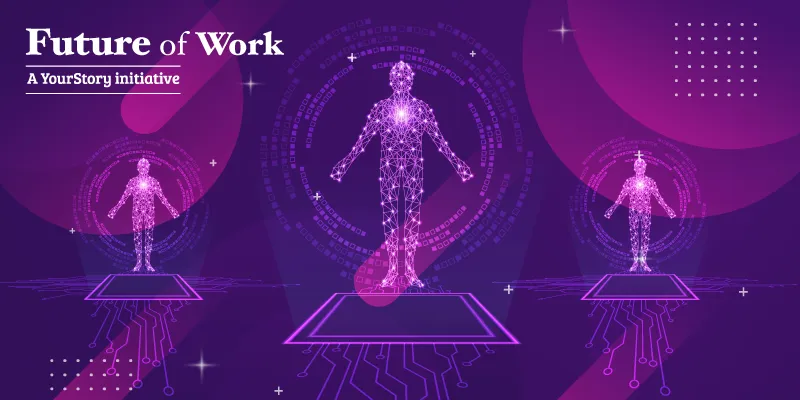How AI is powering the Future of Work: key considerations for business and tech leaders
With increased AI augmentation and the transformation of processes and people that enable it, the topic of the ‘Future of Work’ requires immediate and urgent attention.
The age of Artificial Intelligence (AI) is upon us. Businesses and society are now looking towards AI for transformative outcomes.
Businesses, specifically, are investing huge amounts of money on AI that will not only bring in efficiencies across multiple processes, but also unlock new revenue streams that will deliver significant top line and bottom-line impact.
With the AI transformation playing out rapidly in our personal and professional lives, we need to deeply understand what the future of work will look like in the age of AI.
Within the business organisation, there is a huge need to ramp up skill development interventions. The traditional roles of employees in an organisation are rapidly changing as they are expected to stay in step with the developments in the world of AI.
Business executives are now needed to deeply understand the potential of AI and translate it into a viable roadmap for their business. Technology leaders need to take centre-stage in how their organisations adopt and harness the power of AI. We are seeing a fast proliferation of digital evangelists and transformation officers who are charged with developing a framework within which the future of the organisation will operate.
Here's an AI challenge for enthusiasts & practitioners: Develop an integrated solution powered by AI for early detection of epidemics and to enable quick actions to mitigate and control it.

Head over to the Future of Work 2020 website to grab your Super Early Bird tickets now!
Future of Work, redefined
On a tactical level, the burning question now is: how can organisations build a steady pipeline of future talents with expertise in AI? Mastery of exponential technologies (AI, cloud computing, blockchain, IoT, cybersecurity, etc) will be remarkably important for both business and technical professionals.
It is critical that transformation leaders and digital evangelists are well-versed in building internal capabilities that converge around the nexus of technology competencies, managing a hybrid workforce, and ensuring the adoption and dispersion of AI.
For us to redefine the future of work powered by AI, we need to ensure that a few key enablers come together. We need to expand the scope of executive education and the courseware that goes with it. Next, we need to seriously consider the potential impact of crisp yet impactful courses. Corporations need to augment their training programmes with shorter, time-boxed courseware that can deliver instant impact for the organisation.
Finally, we need to reimagine multiple, personalised career pathways. We need to move away from the traditional one-size-fits-all training and deliver more tailored, fit-for-purpose and relevant education to employees.
Here are the three critical interventions for the business and technology leaders to execute in order to usher in the future of work that is enabled by AI.
Develop new-age skills and competencies in AI
Upgrading the technology competencies and skills of business and technology leaders and their teams seems like the most critical first step. With the landscape of technology is rapidly evolving, we need to urgently upskill the present and future workforce to ensure a quality supply of talent.
We need new-age coursework in computer science that can hugely develop the ability of students in subjects such as AI, Machine Learning (ML), deep learning, Natural Language Processing (NLP), and other AI-related concepts.
On a broader scale, we also need universities and colleges to improve the existing knowledge base of AI-enabling technologies such as cloud, DevOps, blockchain, etc, as well for the workforce.
At present, we see a decent level of advancement in the field of computer science training and education. However, other trades within the technical area also require to be upgraded as well. By doing so, we will be able to ensure wholesome and future-proof education for aspirants who wish to build their careers in the world of AI.
For instance, those studying for a major in the field of electronics could shape their focus on mastering AI-enabling technologies such as GPUs and quantum computing. The students presently pursuing a specialisation in mechanical engineering could achieve some level of sophistication in allied subjects of robotics and 3D printing.
Subject matter experts in the fields of industrial engineering, operations, and supply chain would also do well to extend their skill sets to ML and blockchain as well, thus creating a convergence of their interest areas and realities of the market, which will empower them with the required tools to succeed in the workplace of the future.
Reimagining the process of developing new-age technology
This intervention pertains to embedding design in the process of development and user adoption of AI technology. A commonly held misconception around design of a product or software is that it is restricted to simply the look or feel of the product or software.
This is simply not true. As a Steve Jobs once proclaimed, design is not just what it looks like and feels like. Design is how it works.
For the growth of AI to live up to the hype, we need to reimagine the process by which we develop new-age technology. We need to build design into the fabric of the development and engagement process to ensure that the conceived idea is brought to fruition. Transformation evangelists aiming to spearhead the future of work should treat design as the creative process that aids the development of breakthrough products.
We are already seeing several inroads that design frameworks such as human-centred design and empathy-led design are making in the technology realm. These frameworks not only guide the development process, but also the user experience of the final software/hardware being developed. These frameworks do so by putting the user at the centre of the journey.
Managing the ‘people’ of the future workforce
As I mentioned before, the understanding of traditional roles in the future of work is rapidly changing. New roles are also emerging where data custodians and algorithm-at-scale engineers are put to work to develop the technology that powers the business of the future.
On the macro level, we are seeing rapid changes in the paradigm of staffing as well. With the gig economy in full force, we are seeing more dynamic team compositions – where individuals with varied skill sets are required to continuously augment teams on a need basis.
Advances in the fields of technology and management typically ordain large-scale transformation in the manner in which organisations manage their workforce.
On the micro level, we are seeing that increased instances of automation are requiring managers to build and scale blended teams, comprising humans and AI. This disruption requires a paradigm shift on how the future workforce is managed.
Teams in the future will showcase increased diversity and will be more interdisciplinary than ever before. Managing teams, careers and coaching for improved performance in the future will require a new set of metrics. Change evangelists need to devise these metrics, which will be imperative to how the workforce of the future is managed.
New technologies will require new approaches to project management and staffing. To ensure the supply of these critical skills, we also need courses that provide an education of subjects such as people management.
Our very understanding of our workplace is being rapidly disrupted. Increasingly a convergence of the right people, process, and technology is required to unearth insights from a seemingly exponentially increasing size of data.
To turn this data into actionable intelligence that powers business processes must be the focus of business and technology leaders – as well as educationists that build the talent pipeline for the future. Academia is required to urgently intervene and provide theoretical and practical training in AI subjects to both the existing workforce and the future pipeline of talent.
We also need a dispersion of soft skills that will enable and evangelise this change. With growing interest and appreciation of technologies and platforms around AI and the digital workplace, organisations need to ask tough questions of themselves. The time is now to consider the various forces at play.
With increased AI augmentation and the transformation of processes and people that enable it, the topic of the ‘Future of Work’ requires immediate and urgent attention.
(Disclaimer: The views and opinions expressed in this article are those of the author, and do not necessarily reflect the views of YourStory.)









